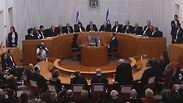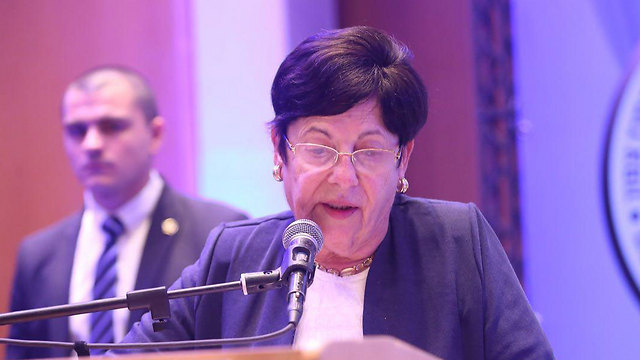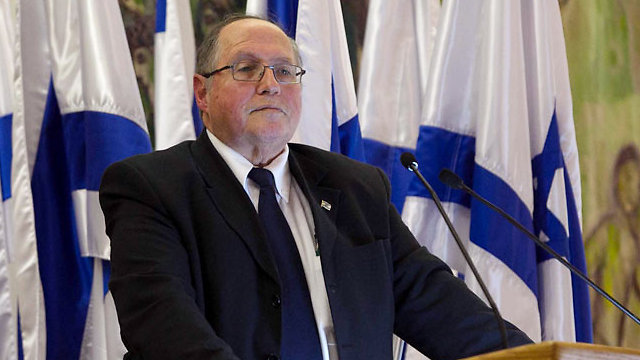
PM, Justice Minister, attack High Court
Minister Ayelet Shaked criticized the High Court's verdict to strike down the governmen'ts gas plan, attacking the institution itself in the process. Current and former justices criticized her back, calling her statements dangerous to democracy.
Netanyahu continued by saying, "Stable democracies (are not stagnant); I respect the court and the Justices, and I respect their decisions. Yet at the same time, in a democracy it's the right of every citizen – including myself – to criticize these decisions. Democracy is harmed in places where you can't sound criticism. Our neighbors don't have (this kind of) criticism."
Netanyahu called the HCJ's verdict "strange," describing it as "severely damaging to the Israeli economy." Despite this, Netanyahu said that "discourse (on the matter) needs to be to objective and not belligerent."
Netanyahu's statements were made a day after Justice Minister Ayelet Shaked harshly criticized the court system at a conference of the Israel Bar Association in Eilat. Supreme Court Chief Justice Miriam Naor was also in attendance.
"Once again, the court has become an arena in which political and macro-economic questions are clarified," Shaked said in regards to the HCJ's gas plan decision. "These are not questions to be decided upon in the large hall (of the court), but in small school and in kindergarten halls once every four years, when people go and vote for their representatives."
Shaked continued, "Justice Aharon Barak called them black holes of 'everything is judge-able,' and I call them governability spaces. Thus, we find ourselves in the situation whereby those who are petitioning against the gas plan are actually different organizations and MKs. they have the right to express their political opinions, but instead of doing it in the Knesset, they're doing it through the court system."
Regarding the stability clause, which the HCJ's ruling struck down, Shaked stated that "the claim being circulatedd is that everything about the gas plan is legal except for the stability clause. We're basically saying 'have fun, the keys are inside,' but we forgot to tell them that the engine is missing. Again we run into authority being exercised irresponsibly."
"The legal tool which the courts made wasn't even legislated in the Knesset," Shaked continued. "This all leads to legal instability, since the government needs to negotiate on a historic scale while the framework in which it acts is unpredictable."
Minister Shaked's statements caused an uproar amongst politicians and the court system. Knesset Member Shelly Yachimovich called on Prime Minister Netanyahu to remove Shaked from her position following her statements against the High Court of Justice.
"Shaked's lashing out at the High Court is violent and dangerous," Yachimovich said. "Shaked is trying to do away with the curt system's independence, and scare and threaten the judges. If these attacks continue, Netanyahu won't be able to boast that Israel is the only democracy in the Middle East."
Former and current high ranking court officials criticized Shaked's statements as well. Former Chief Justice Aharon Barak stated, "My heart is aching. Oh, look at what we've come too."
He continued, saying "Without the rule of law there is no government. On the other hand, the government has wide discretion in regards to policy. The law authorizes the courts to decide what is judge-able. And if there are not other provisions in the law, these 'black holes' need to be filled. The definition of a 'black hole' is that might makes right. Therefore, I'm in favor of expanding judge-ability."
"Threats won't deter us"
Supreme Court Justice Elyakim Rubinstein stated, "Threats won't deter us. We'll do our work as it should be done. The job of gate-keeping in a democracy and in the political system is of utmost importance. It's not (a choice between) either legalizing or imperialism."
Mean while, MK and former Justice Minister Tzipi Livni said that "Shaked stuck a political word into the court. This sword was pulled out not because of the gas plan, but because the HCJ dares to maintain our principals and its independence. This is an argument about principles, not governability."
Attorney General Avichai Mandelblit clarified that he doesn't want to go into political issues. However, he noted that when the elected leadership implements policy, it is always limited by the law. "Verdicts from the High Court of Justice are mandatory, and it's absolute. Our government understands this. The High Court of Justice also defends our image in the international legal fight, and is a component of our power."
Former Supreme Court Justice Yitzhak Zamir had the bluntest response of all, saying, "There's never been something like this. The High Court of Justice has always been subject to review, but there have never been so many blatant attacks on it. In the past, every justice minister knew that they had to defend the Supreme Court."













